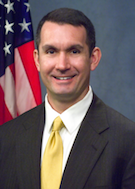
March 06, 2017
Pennsylvania's chief fiscal officer believes the time has come for the Keystone State to legalize, regulate and tax recreational marijuana, outlining in a Monday news conference how taking such a step would help solve the state's imposing budgetary challenges.
Auditor General Eugene DePasquale encouraged state lawmakers to consider opening Pennsylvania up to an industry projected to be worth $20 billion and employ more than 280,000 people in the next decade.
“I make this recommendation because it is a more sane policy to deal with a critical issue facing the state," said DePasquale, a former Democratic state representative in York County. "Other states are already taking advantage of the opportunity for massive job creation and savings from reduced arrests and criminal prosecutions. In addition, it would generate hundreds of millions of dollars each year that could help tackle Pennsylvania’s budget problems.”
DePasquale pointed to Colorado as an example of a state that has reaped the rewards of marijuana legalization since voters approved the measure in 2012. With less than half the population of Pennsylvania, Colorado last year generated $129 million in tax revenue and $1 billion in marijuana sales from the new industry, which has created an estimated 18,000 jobs.
Pennsylvania State Auditor Eugene DePasquale.
“The revenue that could be generated would help address Pennsylvania’s revenue and spending issue. But there is more to this than simply tax dollars and jobs,” DePasquale said. “There is also social impact, specifically related to arrests, and the personal, emotional, and financial devastation that may result from such arrests.”
In Washington, D.C., where possession, use and growth of marijuana have been legal since 2015, reforms reduced the number of related arrests by 98 percent in their first year on the books. While the nation's capital has yet to permit retail sales of marijuana, savings from the new criminal justice approach are significant in their own right.
Citing an analysis by the RAND Corporation, DePasquale pointed to the estimated $2,200 cost of each marijuana arrest and subsequent prosecution. In Philadelphia, decriminalized possession of less than 30 grams of marijuana resulted in a decline from 2,843 in 2014, the year of reform, to 969 in 2016. Projected savings for the city total more than $1.4 million.
Last April, when Pennsylvania legalized medical marijuana, it became one of now 28 states to allow certain forms of the drug to be prescribed for approved medicinal purposes. The development of that system, still in its preliminary application and permitting phases, has emboldened marijuana advocates to seize their opportunity to push for full legalization.
The most recent Quinnipiac poll numbers on recreational marijuana showed an even split in Pennsylvania, with 49 percent in favor and 47 percent against it in 2015. Nationwide, a Pew Research Study from last October found that 57 percent of Americans want recreational marijuana to be legalized.
There are undeniable social hurdles and fears for supporters to overcome, including the false stigma (recently spread by White House press secretary Sean Spicer) that greater availability of marijuana will deepen the nation's opioid epidemic. Attorney General Jeff Sessions also attempted to link marijuana with violence, yet studies have found no such correlation.
Another common concern among parents and medical professionals is the impact the drug might have on minors if its presence is expanded and condoned. A recent survey using federal data found, however, that while more Pennsylvanians are using marijuana than a decade ago, usage among teenagers is actually down.
As state Sen. Daylin Leach (D-17th) told PhillyVoice last year, medical marijuana "will de-stigmatize marijuana. It will create marijuana-based institutions."
DePasquale noted that thorough public consideration of all the pros and cons would be a necessary step for the state.
"Obviously, regulation and taxation of marijuana is not something that should be entered into lightly," DePasquale said. "Should Pennsylvania join the growing number of states benefiting financially and socially from the taxation and regulation of marijuana, there are many things to consider, including details about age limits, regulatory oversight, licensing, grow policies, sale and use locations, and possession limitations."
In a state that could desperately use a new source of long-term revenue, Gov. Tom Wolf's latest budget proposal calls for a slew of spending cuts and departmental consolidations to address a projected $2.8 billion deficit. Overall spending would increase by about 2.5 percent over the previous year's budget to $32.3 billion.
Wolf has again proposed a natural gas drilling tax at 6.5 percent — his third attempt — in order to raise approximately $294 million in estimated revenue. Even though Pennsylvania remains the only state not to impose an extraction tax on natural gas drilling, Republicans in the state legislature have repeatedly shot down such proposals in part because drillers currently pay an impact fee on each well. For the past three years, with fewer new wells, revenue from such fees has been declining, leaving a noticeable dent in the coffers of local governments.
Meanwhile, Pennsylvania's greatest fiscal challenge, the rising cost of the public employee pension system, can only be held at bay for so long before it is sustainably restructured.
To date, only Rep. Jordan Harris (D-186th) has come forward with plans to introduce a bill to legalize recreational marijuana. In his search for co-sponsors, he has echoed Leach's sentiment that the success of such legislation will depend heavily on whether the state's medical marijuana system proves effective from a social, medicinal and financial standpoint.
Wolf has previously signaled that his opposition to recreational marijuana could be subject to change depending on how such programs fare in other states that have taken the lead.
At the state capitol on Monday, DePasquale said Pennsylvania should join those states who will define the future of a profitable industry in the United States.
“The regulation and taxation of the marijuana train has rumbled out of the station, and it is time to add a stop in the Commonwealth of Pennsylvania."
 Source/Pa. House
Source/Pa. House